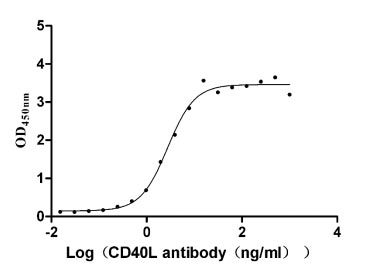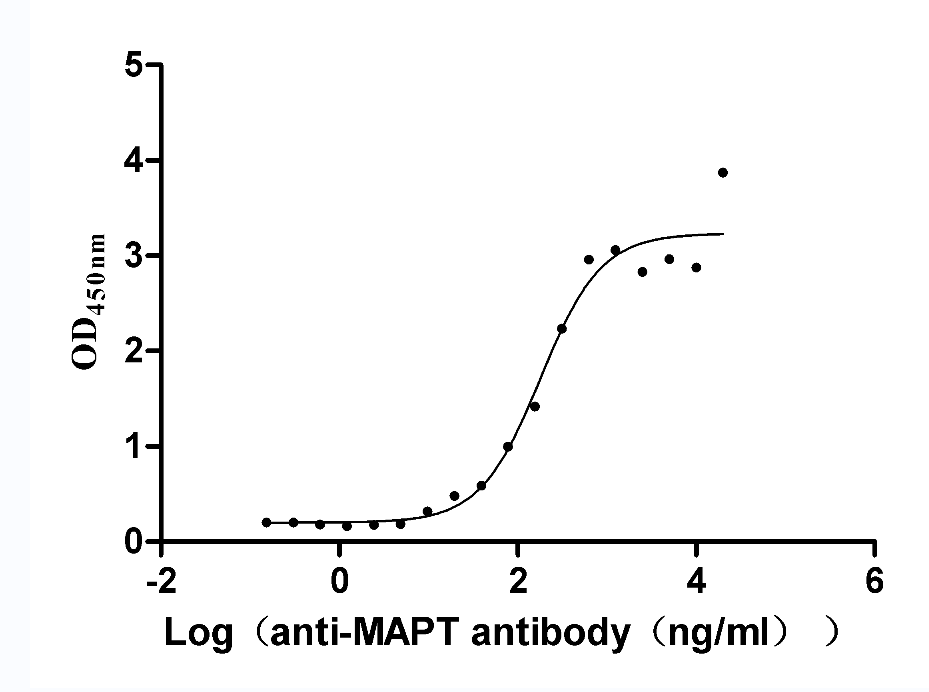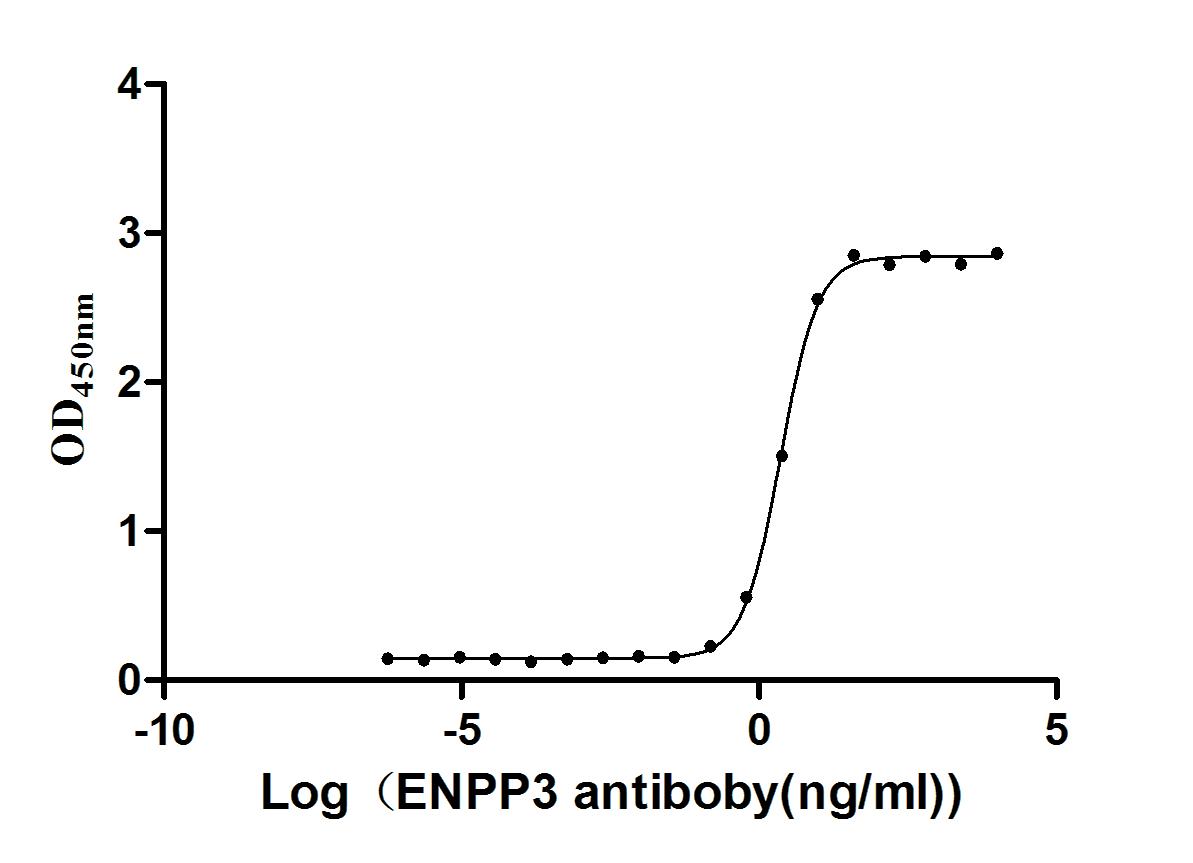Recombinant Mouse Metabotropic glutamate receptor 1 (Grm1), partial
-
中文名称:小鼠Grm1重组蛋白
-
货号:CSB-YP009931MO
-
规格:
-
来源:Yeast
-
其他:
-
中文名称:小鼠Grm1重组蛋白
-
货号:CSB-EP009931MO
-
规格:
-
来源:E.coli
-
其他:
-
中文名称:小鼠Grm1重组蛋白
-
货号:CSB-EP009931MO-B
-
规格:
-
来源:E.coli
-
共轭:Avi-tag Biotinylated
E. coli biotin ligase (BirA) is highly specific in covalently attaching biotin to the 15 amino acid AviTag peptide. This recombinant protein was biotinylated in vivo by AviTag-BirA technology, which method is BriA catalyzes amide linkage between the biotin and the specific lysine of the AviTag.
-
其他:
-
中文名称:小鼠Grm1重组蛋白
-
货号:CSB-BP009931MO
-
规格:
-
来源:Baculovirus
-
其他:
-
中文名称:小鼠Grm1重组蛋白
-
货号:CSB-MP009931MO
-
规格:
-
来源:Mammalian cell
-
其他:
产品详情
-
纯度:>85% (SDS-PAGE)
-
基因名:
-
Uniprot No.:
-
别名:Grm1; Gprc1a; Mglur1Metabotropic glutamate receptor 1; mGluR1
-
种属:Mus musculus (Mouse)
-
蛋白长度:Partial
-
蛋白标签:Tag type will be determined during the manufacturing process.
The tag type will be determined during production process. If you have specified tag type, please tell us and we will develop the specified tag preferentially. -
产品提供形式:Lyophilized powder
Note: We will preferentially ship the format that we have in stock, however, if you have any special requirement for the format, please remark your requirement when placing the order, we will prepare according to your demand. -
复溶:We recommend that this vial be briefly centrifuged prior to opening to bring the contents to the bottom. Please reconstitute protein in deionized sterile water to a concentration of 0.1-1.0 mg/mL.We recommend to add 5-50% of glycerol (final concentration) and aliquot for long-term storage at -20℃/-80℃. Our default final concentration of glycerol is 50%. Customers could use it as reference.
-
储存条件:Store at -20°C/-80°C upon receipt, aliquoting is necessary for mutiple use. Avoid repeated freeze-thaw cycles.
-
保质期:The shelf life is related to many factors, storage state, buffer ingredients, storage temperature and the stability of the protein itself.
Generally, the shelf life of liquid form is 6 months at -20°C/-80°C. The shelf life of lyophilized form is 12 months at -20°C/-80°C. -
货期:Delivery time may differ from different purchasing way or location, please kindly consult your local distributors for specific delivery time.Note: All of our proteins are default shipped with normal blue ice packs, if you request to ship with dry ice, please communicate with us in advance and extra fees will be charged.
-
注意事项:Repeated freezing and thawing is not recommended. Store working aliquots at 4°C for up to one week.
-
Datasheet :Please contact us to get it.
靶点详情
-
功能:G-protein coupled receptor for glutamate. Ligand binding causes a conformation change that triggers signaling via guanine nucleotide-binding proteins (G proteins) and modulates the activity of down-stream effectors. Signaling activates a phosphatidylinositol-calcium second messenger system. May participate in the central action of glutamate in the CNS, such as long-term potentiation in the hippocampus and long-term depression in the cerebellum (By. similarity). May function in the light response in the retina. ...显示更多
-
基因功能参考文献:
- Study states that metabotropic glutamate receptor subtype 1 (mGluR1) is critical for elimination of surplus climbing fiber-Purkinje cell synapses in the cerebellum, retinogeniculate synapses require mGluR1 for maintenance of mature connectivity. PMID: 28711710
- Study shows that blocking of metabotropic glutamate type 5 receptor (mGlu5) reduced the dysregulation of glutamate transmission and improved motor coordination in the metabotropic glutamate type 1 receptor (Grm1crv4) mouse model of cerebellar ataxia SCAR13. PMID: 28982591
- These findings demonstrate that mGlu1 receptors play a key role in excitotoxic degeneration of retinal ganglion cell PMID: 28918254
- this work reveals novel functions of mGlu1 receptors in the bone and indicates that in osteoblasts mGlu1 receptors are necessary for production of normal bone matrix, longitudinal bone growth, and normal skeletal development. PMID: 27989650
- mGluR1 activation at the onset of reperfusion induces cardioprotection and might represent a putative strategy to prevent ischaemia-reperfusion injury. PMID: 28453728
- These findings demonstrate a deleterious positive feedback loop involving elevated intracellular calcium and enhanced mGluR1 function, a mechanism likely to contribute to Purkinje neuron dysfunction and loss in spinocerebellar ataxia type 2. PMID: 28518055
- mouse external globus pallidus astrocytes critically control ambient glutamate level, which in turn gates striatopallidal transmission via the activation of presynaptic metabotropic glutamate receptors. PMID: 27880915
- The results of our study showed that thalamic mGluR1-PLCbeta4 pathway was critical in controlling sleep architecture. PMID: 27998287
- This study confirmed the presence of mGluR1/5 complex by (i) reverse immunoprecipitation using an mGluR1 antibody to pulldown mGluR5 from hippocampal tissue. PMID: 27392515
- results demonstrate that mGluR1 is crucial for the visual-experience-dependent maintenance of mature synaptic connectivity in the dorsal Lateral Geniculate Nuc. PMID: 27545713
- These results suggest that impairment of synaptic mGluR cascades is one of the important contributing factors to cerebellar ataxia in early and middle stages of spinocerebellar ataxia type 1 (SCA1) pathology, and that modulation of mGluR signalling by baclofen or other clinical interventions may be therapeutic targets to treat SCA1 PMID: 27440721
- activation of mGluR1 expressed by OCCM-30 cells induces cell proliferation in a manner that is dependent on mitogen-activated protein kinase pathways. PMID: 27261070
- In a mouse model of human spino-cerebellar ataxia type 1 (early SCA1, 12 weeks) we find prolonged parallel fiber mGluR1-dependent synaptic currents and calcium signaling PMID: 27147646
- Here we identify mGluR1 and mGluR5 as key elements in the dynamic regulation of cholinergic synaptic inputs onto neurons of the TRN. Our findings highlight potential mechanisms that regulate cholinergic signaling in the mammalian brain. PMID: 27466334
- data suggest that Lys(63)-linked polyubiquitination is involved in the ligand-mediated endocytosis of mGluR1. PMID: 28011638
- This study provides evidence that ASIC1a is involved in group I metabotropic glutamate (mGlu) receptor-induced increase in action potential firing. PMID: 28137639
- Homodimerization enhances both sensitivity and dynamic range of the ligand-binding domain of type 1 metabotropic glutamate receptor PMID: 27800613
- Unpredictable chronic mild stress mice exhibited elevated nucleus accumbens (NAC) shell levels of mGlu1alpha. The expression of stress-alcohol locomotor cross-sensitization was associated with lower mGlu1alpha within the NAC core. PMID: 25916683
- Ionizing radiation is able to trigger the altered neuronal differentiation in undifferentiated neural stem-like cells through PI3K-STAT3-mGluR1 and PI3K-p53 signaling. PMID: 26828720
- Because the mGluR1-PKCgamma signaling pathway is essential for the late-phase of climbing fiber synapse elimination, this signaling pathway promotes the two key features of excitatory synaptic wiring in Purkinje cells. PMID: 26858447
- Numb is a regulator for constitutive expression and dynamic transport of mGlu1. PMID: 26621723
- STIM1 is a key regulator of mGluR1-dependent Ca(2+) signaling. PMID: 25304289
- Selective photostimulation of astrocytes with channelrhodopsin-2 in primary visual cortex enhances both excitatory and inhibitory synaptic transmission, through the activation of type 1a metabotropic glutamate receptors. PMID: 24500276
- Results provide unequivocal demonstration of the intrasynaptic localization of mGlu1 receptors in GABAergic synapses and confirm their peri-junctional enrichment in glutamatergic synapses PMID: 25377770
- Activation of mGluR1 facilitates firing of molecular layer interneurons through the TRPC1-mediated inward current, which depends on not only G protein-dependent but also Src-ERK1/2-dependent signaling pathways. PMID: 25181481
- Homer 1a was neuroprotective against traumatic brain injury in vitro and in vivo, and this neuroprotection was associated with its effects on group I metabotropic glutamate receptors. PMID: 24722299
- Stimulation of mGluR1 during glutamate exposure mediates prolonged epileptiform discharges in the hippocampus. PMID: 25568123
- Transcriptome sequencing of melanocytic nevi and melanomas from Grm1 transgenic mice to determine melanoma driver mutations. PMID: 24661573
- a potential crosstalk network between mGluR1 and tyrosine kinase, insulin-like growth factor 1 receptor (IGF-1R). PMID: 24628914
- Results suggest a role for mGluR1 in breast cancer as a pro-angiogenic factor as well as a mediator of tumor progression. PMID: 24633367
- Results indicate that mGlu1 receptor-mediated activation of phospholipase C within the shell subregion of the nucleus accumbens is an intracellular signaling pathway involved in the maintenance of alcohol intake by mice under limited access procedures PMID: 24467847
- Results demonstrate that a lower constitutive level of mGluR1 has a significant positive impact on mice with experimental ALS, providing a rationale for future pharmacological approaches to ALS by selectively blocking Group I metabotropic Glu receptors PMID: 24361555
- Binge alcohol drinking increases mGluR1 signaling within the central nucleus of the amygdala. PMID: 23966068
- activation of both Group I and Group II metabotropic glutamatergic receptors suppress retinogeniculate transmission PMID: 23558090
- We conclude that the long C-terminal domain of mGluR1a is required for the proper perisynaptic targeting of mGluR1 and cerebellar function PMID: 24523559
- The Grm1(crv4) mouse with a spontaneous mutation inactivating the metabotropic glutamate type 1 receptor show overexpression of metabotropic glutamate type 5 receptor and enhanced glutamate release worsening motor-coordination defects in these mice. PMID: 22791805
- mGluR1 recruitment to lipid rafts is enhanced by agonist binding and is supported at least in part by an intact cholesterol recognition/interaction amino acid consensus (CRAC) motif in the receptor. PMID: 24045944
- The activation of mGluR1,5 is likely a potential therapeutic strategy to prevent nervous tissues from excitotoxicity by reducing the impairment of the astrocytes and GABAergic neurons during the early stage of ischemia. PMID: 23280324
- mGluR1,5 activation improves the anxiety-like behaviors of DBA/2 mice. PMID: 22681774
- Both cytokines as well as cellular immune escape mechanisms seem to contribute to the observed immunosuppressed state of tumor-bearing grm1-transgenic mice. PMID: 22674057
- Tg(Grm1)EPv melanoma model exhibits more extensive metastasis into distant organs than previously described. Disseminated cells undergo phenotypic changes, as we observed high numbers of non-pigmented Grm1-expressing melanoma cells within distant organs. PMID: 22882420
- Transient stimulation of mGluR1 alters receptor properties, rendering them persistently active in the absence of endogenous activation. PMID: 23392681
- metabotropic glutamate receptor 1 is involved in 17beta-estradiol and NMDA-induced neuronal death PMID: 23077075
- transient receptor potential 3 which is also needed for mGluR1-dependent slow excitatory postsynaptic potentials and motor coordination and associates with protein kinase C gamma PMID: 23115168
- Data suggest that both T-type and P/Q-type Ca(2+) channels, but not TRPC3 or other Ca(2+) -permeable channels, are involved in mGluR1 and PKC signaling leading to the inhibition of dendritic growth in cerebellar Purkinje cells. PMID: 22188405
- Group I mGluRs are a potentially important source of neuromodulation within the spinal cord that can modulate the intensity of motoneuron output during motor behavior. PMID: 21346211
- Disruption of mGluR1 signaling at parallel fiber-Purkinje cell synapses is a major synaptic defect in sg/sg mutant mice, correlating with spinocerebellar ataxia (SCA) type 1 pathology in the extreme mouse model. PMID: 21558162
- novel insights into the mechanisms of intracellular Ca(2+) mobilization by mGluR5 in the somata of hippocampal neurons PMID: 22028929
- Low-frequency potentiation of mossy fiber excitatory postsynaptic potentials (EPSP) requires postsynaptic mGlu1 receptors for induction but is expressed presynaptically as an increased release probability. PMID: 22114260
- Genetic reduction of mGluR1 modified a few select Fmr1 knockout behaviors PMID: 21571007
收起更多
-
亚细胞定位:Cell membrane; Multi-pass membrane protein.
-
蛋白家族:G-protein coupled receptor 3 family
-
数据库链接:



















